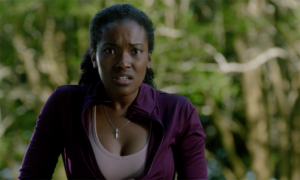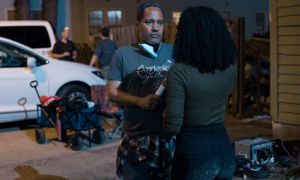Best known for being the writer-creator behind the legendary Final Destination film franchise, Jeffrey Reddick’s gruesome take on fate and death redefined the horror genre after the first film was released in 2000 and spawned a series of hit sequels along the way.
However, it wasn’t until sometime later that Reddick embarked on his first project as a director, visualising his script for the screen. He directed his first short film Good Samaritan, which he expanded into a feature story, Don’t Look Back.
In the new feature film, when a woman overcoming her own violent trauma is among several witnesses who see a man fatally assaulted and don’t intervene, they find themselves targeted by someone, or something, out for revenge. Is it the work of a vigilante, or is it karma?
Jeffrey Reddick tells us more…
You’ve been a screenwriter for many years, but you only just directed your first film. Is it something you always wanted to do, or was it a new ambition?
I’d say it’s something that only came up in the past few years. Having had so much work adapted into films I enjoyed, but were very different from what I’d written, I was a little arrogant in thinking ‘I can make this exactly how I wrote it’. Of course, I didn’t realise all the other stuff behind the scenes that can change that! Having now had my first taste of directing, it’s definitely something I want to do more of. I’m a huge horror fan so there are many more stories I’d like to tell.
What’s your experience been in terms of other filmmakers adapting your work?
I started working at New Line Cinema when I was 19 so I knew how the filmmaking process works. I’ve never been precious about stuff, the only time it’s bothersome is if something might be done for a really low budget and you lose the opportunity to show certain effects, for example. But I’ve always found the whole process super interesting and every filmmaker you meet has a different, unique style and I respect that. Scripts can be interpreted in very different ways.
Movies are really hard to get made, and I’m grateful to be a working writer, so I’m always in a mindset of gratitude, rather than getting too caught up in ‘that’s not how I imagined it looking’. However, I’m also getting to the point now where I can have more control over budget and ensuring we have enough time and resources to get certain things right.
Writing can be a solitary effort. What’s your approach on set as a director?
I come from a theatre background and one of the best things we were taught was to understand the crew is just as important as the cast. So, I try to be collaborative with my actors. My approach has always been to bring together the most talented people I can, across different departments, and we collaborate.
On Don’t Look Back I spent a lot of time speaking to the actors, especially Kourtney Bell, long before we got to Baton Rouge where we filmed. I wanted her to own this character. I also work very closely with all the heads of department. It takes a village to make a movie and sometimes you gain input which makes what you have in your head a whole lot better! So, it pays to be open and listen to people.
Kourtney Bell is phenomenal in the lead role; how did you find her?
Initially her name came up, I did some research, looked at her website and saw a lot of short films she’d been in. Interestingly, I saw aspects of the Caitlin character in pretty much every role she did. She was so versatile every time! After that, she read for the role but to be honest I didn’t even need the audition, I thought ‘holt shit, she’s it’.

The image of the crow is a powerful visual in the film, how did you come up with that idea?
I wanted something that hinted at supernatural but is also ambiguous. Without any spoilers, the crow represents death being present, but it’s still unclear whether it’s supernatural or caused by a person. The crow image works on both paths and makes sense in either scenario.
We used real crows throughout, and real mice in another scene. The crows were great, but it took a while to get certain shots. There’s a scene where the crow flies into shot, lands and flies away. I didn’t realise until watching playback later that we had the actors in shot, standing at the window for like 45 mins, waiting for the crow to get it right. They say don’t work with animals [laughs]! If I have the option, I’d always use real crows over CGI, but I joked that these crows were the biggest divas on set!
Going back to the franchise that launched your career, how did the idea for Final Destination first present itself?
The seed of the idea for Final Destination came from an article I read when I was on a plane, flying home to Kentucky. I saw this article about a woman who was on vacation and got a call from her mother, telling her not to catch the flight she was due to take the next day, because she had a bad feeling about it. So, she changed flights and the plane she was due to fly on crashed. I thought it was an interesting, spooky concept.
Then, I wrote a spec TV episode for The X-Files in order to get an agent. I was working at New Line Cinema and had some colleagues who said, ‘don’t send this into The X-Files, it’s a great idea for a feature!’ So, I worked it out into a treatment. Originally, the characters were all going to be adults but after Scream came out, we were encouraged to make them teenagers.
What’s funny is that we had a hard time selling it to New Line, even though I worked there, and even though the producers had a deal there. New Line couldn’t get their heads around the concept of death being the killer – you can’t see it, you can’t fight it. But that’s the point! They had us rework and rework it and eventually, after we threatened to take it to another studio, they bought it. Even when they brought on James Wong and Glen Morgan, his producing and writing partner, people were still hung up on the death thing, but thankfully James fought to not show death as some kind of character. I believe that’s far more powerful and one of the reasons it did so well. If you simply represent it as a force, different audiences can project their own ideas of death into this inescapable scenario.
When you sold the first Final Destination script, it must have been a very exciting time?
It was, but it was interesting because I still kept my job at New Line. I sold it in 1997, and it came out in 2000. I continued working at my job and finally when I sold the second film, my New Line bosses called me in and said: “Jeffrey, we love you, but you can go into the world and be a writer now” [laughs].
Since I was still working and didn’t get into the LA scene with all the parties and meeting celebrities, I didn’t really get caught up in the showbusiness side. Up to that point, I had lived in a bubble in New York and didn’t really understand how big Final Destination had become. Of course, after I moved to LA and started going to more meetings, I saw it.
When the film was released, were you surprised at the huge reaction or were quietly confident you’d made something original?
I was quietly confident we’d get sequels, because I could see that happening and I knew how the industry worked in that regard. As for predicting how much of a cultural phenomenon it would become, I had no idea. Even today I’ll be out, and I’ll hear people nearby talking about having a ‘Final Destination moment’ which blows my mind. You can’t really predict something like that.
Final Destination 6 is apparently in development. Is it a franchise you’d ever want to go back to?
I’m very proud of it and the producer Craig Perry is a dear friend of mine, so it’s in great hands. I’d love to go back if we could bring a different spin to it, but I know there’s a successful formula and as they say, if it ain’t broke, don’t fix it. We’ve had some great explorations around this particular design on how death gets people, but the fascinating thing about the concept, at least for me, is that death can have many designs. I think I’d always be interested in going back, but I’m also happy doing something fresh and exploring new ideas.
What are you working on right now?
I’ve been location scouting for my first slasher movie. I’m really excited and I’m determined it will be R-rated, it will not be PG-13! I miss the good old slasher days where you actually saw violence and gore. Thank god for Scream, and Happy Death Day was really fun too. Speaking as a horror fan, I can’t wait for this one and there will be more to announce soon.
What can fans expect from Don’t Look Back?
It’s not a horror film in the traditional sense, but I’m quick to point out that I hate it when horror writers do interviews and say ‘it’s not really a horror film, it’s a supernatural thriller’ or something [laughs]. Then you watch it, see it’s clearly a horror and it’s like ‘horror’ has become a dirty word. So, I’m saying this more to manage expectations. Rather than a ‘whodunnit’, it’s like a ‘what’s doing it?’ mystery with supernatural overtones.

I really wanted to tell this story as I’ve found myself affected by our lack of empathy for each other around the world. It’s always been a problem, but I believe it’s become worse in the last few years with social media. It’s a very sad and distressing time in society.
With the culture of cell phones and social media, some people want to become internet famous and will see something horrible happening, but instead of calling the police, they’ll film it to post online so it goes viral. It really bothers me. I try not to get too preachy, but this was definitely my biggest ‘message’ movie. Hopefully Don’t Look Back makes you think, keeps you engaged and in suspense, and I’m very proud of the film.
Any final words?
I always give a shout out to the horror fans because, while they don’t always love what you do, they’re very loyal, honest and amazing. Without them, we genuinely wouldn’t have careers so I’m grateful to all the fans who support and appreciate horror movies.
Don’t Look Back is out now on DVD & Digital. Order your copy here. Main image credit: Credit – Joseph D’Urso
